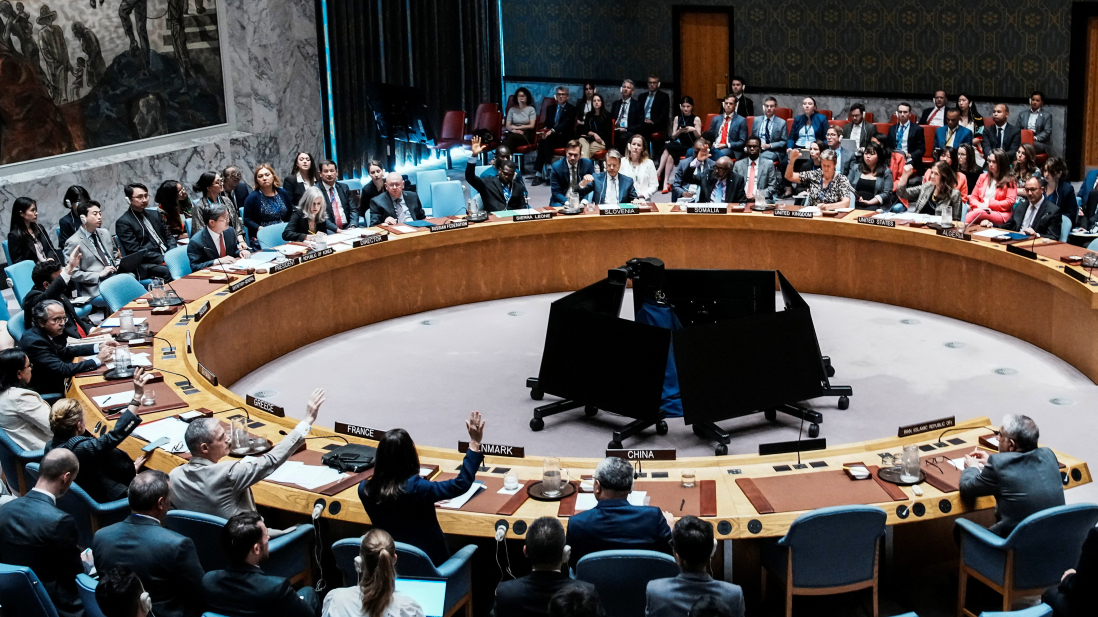U.S. envoy says ‘meaningful progress’ made as Ukraine talks enter second day
U.S. special envoy Steve Witkoff said talks between Russia and Ukraine had brought “meaningful progress” towards ending the war, as negotiations m...

The United Nations Security Council did not adopt a draft resolution on Friday to permanently lift sanctions on Iran, but Tehran and key European powers still have eight days to try and agree to a delay.
The UN Security Council voted on a draft resolution after Britain, France, and Germany initiated a 30-day process on 28 August to reimpose sanctions, accusing Tehran of violating the 2015 nuclear deal.
Russia, China, Pakistan and Algeria voted in favor of the draft text on Friday. Nine members voted against and two abstained.
IRAN SAYS VOTE OUTCOME 'WEAKENS DIPLOMACY'
"The door for diplomacy is not closed, but it will be Iran, not adversaries, who decide with whom and on what basis to engage," Iran's UN Ambassador Amir Saeid Iravani told reporters after the vote.
Iran's Foreign Minister Abbas Araqchi will meet with his European counterparts in New York next week on the sidelines of the UN General Assembly, he said, adding that Friday's divided vote showed there was "no consensus in the council".
"This decision weakens diplomacy and risks dangerous consequences for non-proliferation," Iravani said.
Britain, France, and Germany have proposed delaying sanctions for up to six months to facilitate talks on a long-term nuclear deal, contingent on Iran allowing UN inspectors, addressing uranium stock concerns, and engaging with the U.S.
"Without these most basic conditions being met, there is no clear path to a swift diplomatic solution," Britain's UN Ambassador Barbara Woodward told the council.
U.S. REMAINS READY TO ENGAGE, ENVOY SAYS
Acting U.S. Ambassador Dorothy Shea stated that the U.S. "no" vote doesn't hinder diplomacy, and that sanctions on Iran can be lifted later through negotiations.
"More importantly, President Trump has continued to reiterate the United States’ ongoing readiness for meaningful, direct, and timebound dialogue with Iran – be it prior to the conclusion of the snapback process on 27 September, or after," she told the council.
Meanwhile, Russia and China, allies of Iran, finalised a resolution to extend the 2015 deal for six months and call for immediate negotiations, but haven’t requested a vote. Both have rejected the European push to reimpose sanctions.
China's UN Ambassador Fu Cong warned that triggering snapback could derail diplomatic efforts and lead to unforeseen catastrophic consequences.
Cuba’s fuel crisis has turned into a waste crisis, with rubbish piling up on most street corners in Havana as many collection trucks lack enough petrol to operate.
Iran’s Revolutionary Guards navy held military exercises in the Strait of Hormuz on Monday (16 February), state-linked media reported. The drill took place a day before renewed nuclear negotiations between Tehran and Washington in Geneva.
The 2026 Munich Security Conference (MSC) unfolded over three intense days in Munich, confronting a defining question of our era: has the post-Second World War international order collapsed - and if so, what will replace it?
Canadian Prime Minister, Mark Carney, announced on 16 February that the Honourable Janice Charette has been appointed as the next Chief Trade Negotiator to the United States. She's been tasked with overseeing the upcoming review of the Canada-United States-Mexico Agreement (CUSMA).
Ruben Vardanyan has been sentenced to 20 years in prison by the Baku Military Court after being found guilty of a series of offences including war crimes, terrorism and crimes against humanity.
U.S. special envoy Steve Witkoff said talks between Russia and Ukraine had brought “meaningful progress” towards ending the war, as negotiations moved into a second day in Geneva.
The United States and Iran reported measured progress after a new round of indirect talks in Geneva aimed at resolving the dispute over Tehran’s nuclear programme.
An unidentified man was taken into custody on Tuesday (17 February) after running towards the U.S. Capitol carrying a loaded shotgun and wearing tactical gear, according to Capitol Police Chief Michael Sullivan.
Peru’s Congress has voted to censure and remove José Enrique Jeri Ore from his posts as President of Congress and acting President of the Republic, just four months into his tenure, citing undisclosed meetings with Chinese businessmen and alleged hiring irregularities.
France celebrated Olympic gold in the men’s biathlon relay in Anterselva on Tuesday (17 February), following a thrilling race marked by an electric atmosphere at the stadium.
You can download the AnewZ application from Play Store and the App Store.

What is your opinion on this topic?
Leave the first comment